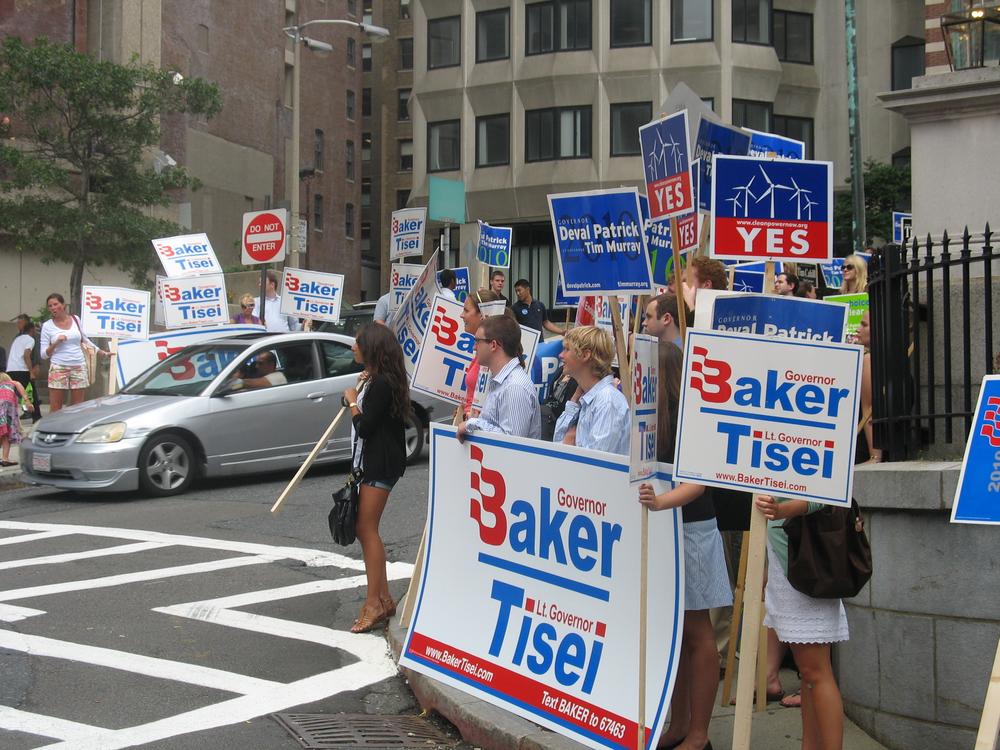Advertisement
At Gubernatorial Debate, Patrick Defends Cape Wind
Resume
Cape Wind, the Nantucket Sound wind energy development, is in the final stages of review by the Department of Public Utilities. A decision is expected this fall, while Gov. Deval Patrick is still in office. But his opponents in this fall's gubernatorial race say they would chart a different course for the state even if Cape Wind is approved.
The issue highlights stark differences in the approach each candidate takes on energy and the state’s role in promoting a “green” future — and those differences took center stage in a Monday debate sponsored by MassINC.
Patrick is the only candidate who backs the proposed Cape Wind development as is. He's supported it through many rounds of state and federal reviews. Cape Wind, Patrick said, is "good for us from an environmental point of view, from an energy point of view, from an economic point of view and from a symbolic point of view."
The governor says Cape Wind is emissions-free local power that is reasonably priced, would create jobs, would protect the state from the swings in world natural gas prices and would put Massachusetts out front in the emerging wind industry.
"It’s amazing that only in Massachusetts can we say that a project that has taken 10 years to get from concept to final approval is hasty."
Gov. Deval Patrick
"We need to get serious about climate change," Patrick said, "and not just talking about it, wringing our hands about it, but taking steps that are tangible."
Patrick stands alone on this issue in the governor's race. Even Green-Rainbow party nominee Jill Stein says building Cape Wind’s 130 wind turbines under the proposed contract is a bad idea. "As Cape Wind comes to us today, it’s clearly not delivering the most green energy for every dollar invested," Stein said. "And it’s asking for an enormous investment, probably two-and-a-half billion dollars, that will mostly come from ratepayers."
State Treasurer Timothy Cahill, who is running as an independent, agrees the contract is flawed. But unlike Stein, who would rewrite the deal, Cahill rejects Cape Wind outright because says the power it generates would be too expensive as compared to other sources.
"Clearly this is not the right path to bring energy independence to this state," Cahill said. "We should look at the alternatives such as nuclear and natural gas to supplement that process."
"As Cape Wind comes to us today, it’s clearly not delivering the most green energy for every dollar invested."
Jill Stein
Republican Charles Baker also rejects Cape Wind. Baker says the project is a risky investment with murky terms that will raise already electricity rates that are already too high in the commonwealth.
"As I travel around the state and talk to business after business after business about the high cost of doing business in Massachusetts, I can’t possibly, on an issue like this, come down on the side of going forward, " Baker said.
Cape Wind will sell electricity for 18.7 cents per kilowatt hour in the first year. Baker says that's higher than the peak wholesale rate for at least the last decade. The price of Cape Wind power, which will rise over the life of the contract, would be factored in with other lower cost energy, so the actual increase on your bill and mine would be significantly lower.
Still, several candidates suggested that Patrick has moved too quickly on Cape Wind while overlooking other new energy sources.
"We should look at the alternatives such as nuclear and natural gas to supplement (energy independence)."
Timothy Cahill
Patrick shook his head. "It’s amazing that only in Massachusetts can we say that a project that has taken 10 years to get from concept to final approval is hasty. It's been through 17 different agency reviews, thousands and thousands of documents submitted and reviewed. Look, it’s not the solution," Patrick said.
The candidates also disagree about whether the state should intervene with or stay out of the energy sector.
Cahill says government policies that promote renewable energy are misguided. "I don’t think we need to subsidize," Cahill said. "I think we need to get out of the subsidy and tax credit business; lower taxes across the board and let the private sector pick the winners and losers rather than government."
But Patrick says new energy facilities need government support to compete with existing plants.
Stein points out that many government policies offset the cost of using oil and gas.
"How can you defend Cape Wind, the biggest no-bid contract in the history of the commonwealth, while you're opposing other issues because they're no bid contracts?"
Charles Baker
The debate occasionally veered away from energy and into politics.
Baker posed this question to Patrick: "Two weeks ago, you made a big deal about how you weren't going to be party to no-bid contracts in the context of licensing slot machines at the racetracks. How can you defend Cape Wind, the biggest no-bid contract in the history of the commonwealth, while you're opposing other issues because they're no bid contracts?"
Patrick said Cape Wind has followed the same rules as any other group that proposed building a new energy facility. He argued that the way the Cape Wind deal was forged broke new ground.
"What has also happened in the course of Cape Wind is that a whole new rate structure has been invented," Patrick said. "So I think it is hardly comparable to talk about no bid deals for race track owners and treating this power generation project like every other power generation project has been treated."
More:
This program aired on August 17, 2010.
